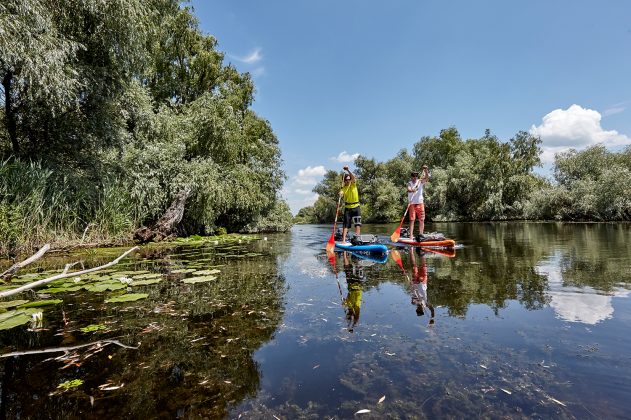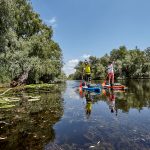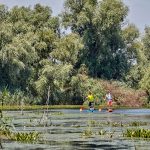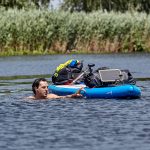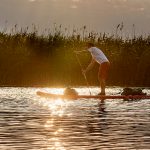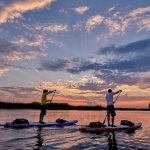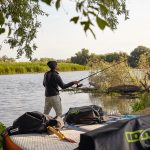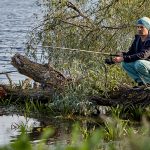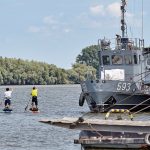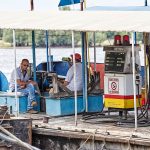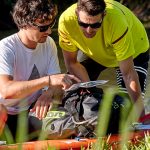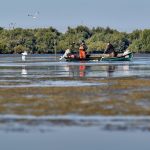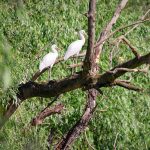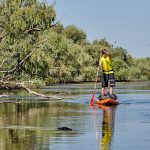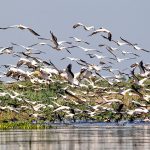THE DANUBE
Words & Photos Christian Penning
The Danube Delta is one of the wildest corners of Europe. A labyrinth of jungle-like waterways bedecked with climbing vines that hide kingfishers, pelicans and floating islands leading into a mystical world of deep forests and rivers. Sadly like any paradise, it is under threat.
It’s the extraordinary images that burn into my memory, like in the swashbuckling movie ‘Fitzcarraldo’. At the river bend not 30 meters ahead is a paddle steamer, in the middle of the jungle. I expect to see Klaus Kinski on the bridge, an eccentric, crazy look in his eye, on a mission between genius and madness. The foghorn sounds. Long. Drawn out. Deep. “Get out of here!” Stefan, Simon and I increase our cadence, paddling hard for protection in the scrub along the shore. Just in time! It’s already on us, this monster of a ship. It fills the narrow watercourse almost completely. We stare upwards. No Kinski, no Fitzcarraldo. But the passengers stare at us on deck, as if they had just seen Indians in their dugouts. But we’re not in the Amazon. We’re paddling on the Danube. More precisely, on one of the countless small capillaries in the labyrinth of the Danube Delta.
A minute later, the green wilderness has swallowed the sonorous chugging of the diesel engine. The haunting is over. A kingfisher flutters over from its nest up in the clay banks. High above in a rare glimpse of blue through the canopy, pelicans circle in the sweltering summer air in front of building thunderclouds. This is a dreamscape, sprung from the imagination of nature. Enormous. Opulent. Strange sounds penetrate from the reeds twice as tall as a man. Huge willows stand like guardians on the shore. Connected and entangled by a three-dimensional web of creepers, ivy and lianas. The impenetrable heart of the river.
The idea came about during an evening paddle on the Tegernsee lake, Austria, with sup specialists Stefan and Simon. “What if …” I asked the guys, “what if we did something different with the boards, rather than paddling in circles on the lake?” Something like crossing the Alps on a bike, I thought. Stefan and Simon grew up on the Tegernsee and Schliersee lakes and have codes for water adventure in their genes. They were immediately fired up.
“After the Galapagos Islands and the Great Barrier Reef, the delta of the Danube where it meets the Black Sea, is one of the most diverse regions in the world”. After just one search, Google had offered the perfect destination. This was it! We could get there without round-the-world flights, but it was still exotic and unknown. But the Danube Delta is a jumble of rivers, tributaries, lagoons, lakes and alluvial plains, about twice the size of Luxembourg. Our getting lost in the bronchial waterways of the river was as assured as a tourist without a satnav getting lost in the urban-jungle of Berlin.
Hope returned as our research directed us to a chap by the name of Cristian Mititelu. The 43-year-old grew up in Tulcea, on the edge of the Danube Delta. Since 2011 he has been working for the World Wide Fund and as a guide for bird-watching tours. Via phone calls and Google Earth, Cristian gave us tips for the route and GPS coordinates of important launch points.
When we finally water the boards at the Tulcea marina in mid-June, there is still an almost tangible tension in the air. Are the rough maps and the few fixed coordinates sufficient for orientation? What about currents? On the broad southern arm, which embraces the delta like a pair of tongs, the Danube flows through the last stretch of its more than 2800
kilometers long journey from the Black Forest to the Black Sea and at the port of Tulcea, the huge aluminium refinery dominates the skyline. But with every paddle stroke this morbid industrial backdrop shrinks on the horizon. After two kilometers of rocking in waves between cargo ships and motor boats, we branch off to the north of a side channel to find less flow, less waves, fewer boats, more birds singing, more nature. A fisherman’s hut here and there, hardly any traces of civilization, other than the occasional tourist boat that insists on squeezing through the narrowest of channels.
Cristian Mititelu is a thorn in the side of such operators. Together with the WWF, he campaigns for gentle tourism in the Danube Delta. He calls this Slow Tourism. “But what most operators practice is Very Fast Tourism,” he criticizes. The biggest problem is Romanian day trippers who rush through side channels in speedboats, startling the wildlife”. When the sun is shining high over the water, the Canal Sireasa in the western part of the delta provides a little tailwind on the last stretch of our first 16km. This is good, because the current is barely noticeable here. A small hut belonging to a fisherman called Alexandru crouches on the hilly pasture shoreside.
“Nice guy, you can camp in the garden,” Cristian told us. But no one but a growling dog is at home. We found out later that Alexandru had to undergo an appendectomy operation to the hospital in Tulcea. He didn’t go by car, but by boat. Like many of the settlements and small villages scattered throughout the Danube Delta, Alexandru’s cottage can only be reached by water.
Cristian had warned us that the delta was like a huge flooded forest. “Where to now?” Stefan asks. Simon discovers a dam on the northwest edge of the delta. “Up there, we’ll drag our asses up for a night on dry land,” he grins.
It’s going to be a restless night. Instead of sleeping the inhabitants of the wet jungle come out to party. Legions of frogs produce and almost deafening natural techno. Occasionally the volume ebbs away only to flood moments later with a thousand times the croaking at an even higher decibel. Through our half-sleep the sound of galloping hooves enters the mix. A snort. Very close to the tent. Is it one of the wild horses that lives in the delta, or a wild boar? At dawn suddenly a new noise fills the air. A huge flock of white pelicans is smashing a shoal of fish from the air just 20 metres away.
Ten minutes later we’re on the water, paddling toward the marshy lakes Lacul cu Cotete and Lacul Carasu, our goal for the morning. Shallow banks and dense barriers of aquatic plants make this lake waterscape almost impossible for larger vessels to access. It’s a real paradise for paddling and a refuge for waterfowl; some 2000 animal and 3000 plant species inhabit the Danube Delta. Silently, our SUPs glide past skeletons of pale, dead trees. Egrets, cormorants, wild geese, ducks, and small creatures hiding in the reeds are all chattering, singing and croaking wildly. Two white- tailed eagles spread their wings in the tops of a silver willow. Without a word two fishermen – one cigarette butt in the corner of his mouth – set traps and nets with long wooden poles.
As recently as fifty years ago, fishing was the main source of income for the inhabitants of the Danube Delta. “Today’s catch is sometimes not even enough to cook a meal for the tourists that rent rooms from the fishermen in summer”, Cristian explained. And so the Lacul cu Cotete seems ever more like a virgin paradise. “Jungle Book!” Stefan beams in disbelief. He paddles ahead through a water avenue, lined by jungle giants up to 30 meters high. Then he starts paddling with even more vigour. “Come on, we’ve got a lot to do today!” When we were making coffee, the gas stove gave up the ghost, rendering the supplies of dry food worthless. Our solution: continue paddling on empty to the next village.
It’s already early afternoon and the closest village, Mila 23 in the middle of the Danube Delta, is still well over 30 kilometers away. Before this trip Stefan had never paddled more than 20 kilometers in one day, Simon had never been more than 10.
At times, the current is very much on our side. But then it gets tough. The forest opens up, the sun burns. The head feels like a pressure cooker just before it bursts. The shoulders hurt. It’s still 15 kilometers to Mila 23. A leap into the water brings some relief to your head and body. In the evening sun deep orange shores appear on the horizon, the first rooftops. Mila 23. Finally! A few simple modern buildings are mixed in with the wattle and daub cottages. There are two ‘mom and pop’ shops in the village. A cooker? No chance! So Stefan and Simon clear the shelves of salami, cheese, white bread and canned fish, securing our diet for the next two days.
The next morning, and two hours’ paddle north of Mila 23, solitude has returned. Suddenly fluttering shadows pass in front of the sun, it’s a flock of hundreds of pelicans with all the power of a squadron of Transall C-160 planes landing on a wide expanse of water between two river branches lined with water lilies and reeds. Seconds later, the stream is boiling. Wings beat, beaks flashing with silver fish. A few cormorants try their luck in the frenzy with some success. Millions of migratory birds from Asia, Northern and Eastern Europe depend on the Delta as a summer residence, and as a hub and food station for their long-haul flights south to Africa. After yesterday’s marathon, it is now time for the contemplative side of paddling. For around two hours, Simon and Stefan sit spellbound on their boards, watching the birds.
Frogs are everywhere, and some even dare to jump from their carpet of pondweed, water lilies and algae onto the boards. “It’s like a nature film,” muses Simon, “and we are in the middle!”.
In the afternoon a tidy tailwind augments the passage through a reed channel into the Lacul Miazazi .This is a huge lake but without a single boat. It quickly becomes clear why: the water surface is almost completely overgrown with aquatic plants. Even the SUPs which carry hardly any draft only move forward with difficulty. Again and again, meter-long flags of weed collect on the fins. The only option is to turn back! The wind which is now bang on the nose has increased. Small crests form. Four paddle strokes forward, three back. Simon and Stefan drop to their knees to reduce wind resistance. Simon says he can see the plane home from Bucharest to Munich leaving without us the next day. It’s just a good thing that the wind dies off two kilometers further on in the shelter of the bank because now a healthy counter current has kicked in.
The next morning the wind turned and with a tailwind, we arrive relaxed in Mila 23 in the late afternoon. We decided to find a bed in a small house on the river for the last night. “Where is the best restaurant around here?” Stefan asks the young host, Christina. “One moment,” she says, “I ask my mother.” Not five minutes later, Christina is back. “You should eat with us this evening!” she laughs invitingly. Not long after, Christina serves up steaming fish soup with potatoes, tomatoes, peppers and onions – a specialty in the Danube Delta. Christina speaks perfect English with a London accent. Like so many young people from the Danube Delta, she left years ago with her boyfriend, looking for jobs, for a better future. But even in London all that glitters is not gold. It’s been a year now since Christina came back with her husband and her little boy to Mila 23, the village where she grew up. Where still today, there are no cars. Where in the winter, when the rivers freeze and for weeks the ice-breaker doesn’t appear, you are cut off from the rest of the world. Forgotten by the administration in Tulcea. It is not an easy life. But Christina wants to stay here – at least as long as her son Dimi grows up. “Actually,” she says, “we live in paradise. Where else can you jump from the terrace to the water? Where else can you visit your friends by motorboat, go fishing every day?” She shows us pictures from a winter. A baby on a sledge with ornate metal runners from almost 100 years ago. “Was that your granny?” Christina laughs: “This is my son!” Slowly I begin to understand. Christina nods meaningfully. Ceausescu, about wants to convey this simple peaceful spirit to her offspring. And perhaps a little bit to her guests. “Come by again!” She exclaims the next day when the water taxi leaves for Tulcea. Wistfully, Stefan and Simon wave to Christina and Dimi. How much they would like to accept the offer and stay in the Delta for a while. SUP International
THE MISSION TO SAVE THE DELTA
Cristian Mititelu, 43, grew up in the Danube Delta and sits on a sustainable tourism panel for the region. He works as a local coordinator for projects of the environmental organization, WWF.
From an environmental perspective, what is so special about the Danube Delta?
The Danube Delta is a unique area: after the Galapagos Islands and the Great Barrier Reef, it is the area with the most animal and plant species. In Europe, it is the most species-rich region of all. But the paradise in the Delta is no longer fully intact.
How so?
Under the government of Nicolae Ceausescu, about 25 percent of the Danube Delta was drained. These measures still affect the remaining wetlands negatively to this day. The water level drops, lakes fill with sediment and the fish die. In addition, there is some reckless tourism with loud, fast motor boats. And exploitative overfishing has ruined traditional fishing.
And the residents depend on fishing for their survival?
The stocks have fallen massively. There are regulations for protection from the EU. But they hardly take into account the local conditions and needs of the local fisherman, regulations are not enforced effectively anyway. So still, a brutal mafia fishing business flourishes. This kills not only the target species, but also the baitfish and all the other life in the water. But despite the ban on sturgeon fishing, they are still in decline No wonder: on the black market in Bucharest, one kilo of caviar fetches between 500 and 700 euros.
What do you propose for a solution?
With renaturation projects and soft tourism, we want to rebalance the Danube Delta ecosystem, show the local people income opportunities, and raise awareness among business, administration and visitors about the importance of preserving natural paradises such as the Danube Delta in their original condition. EU funding helps us to do this but in the face of bureaucracy, mismanagement and lack of controls, I sometimes find myself on a “mission impossible”. But we will not give up.

